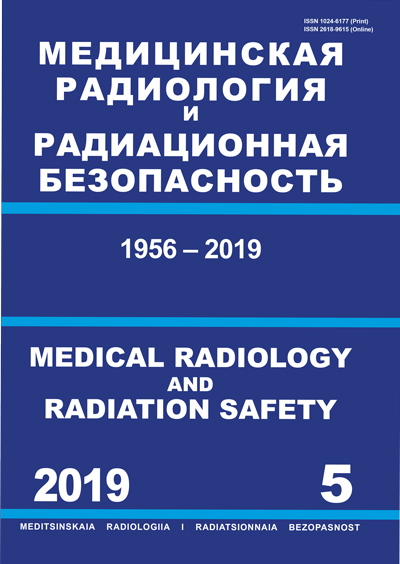CSCSTI 76.03
CSCSTI 76.33
Russian Classification of Professions by Education 14.04.02
Russian Classification of Professions by Education 31.06.2001
Russian Classification of Professions by Education 31.08.08
Russian Classification of Professions by Education 32.08.12
Russian Library and Bibliographic Classification 51
Russian Library and Bibliographic Classification 534
Russian Trade and Bibliographic Classification 5708
Russian Trade and Bibliographic Classification 5712
Russian Trade and Bibliographic Classification 5734
Russian Trade and Bibliographic Classification 6212
Purpose: To increase local control of cervical tumors by developing and introducing into practice the optimization of dose distribution in the primary tumor during concomitant chemoradiation (CRT) and image-guided adaptive brachytherapy (IGABT) i.e. summing up the maximum dose to the tumor volume of HR-CTV> 85 Gy in the shortest possible period of time by the optimal fractionation regime, without increasing the tolerable doses to the organs of risk (bladder, rectum, sigmoid). Material and methods: Data of the study was the of clinical observations of patients with locally advanced cervical cancer proven stage IIb–IIIb according to FIGO, treated with curative radiation therapy. After pelvic +/- para-aortic external-beam radiation therapy (2 Gy × 50 Gy with Cisplatin 40 mg/m2 weekly), they received high-dose rate intracavitary brachytherapy or in combination with interstitial component following GEC-ESTRO recommendations. Results: We managed to achieve maximum dose to the tumor volume of HR-CTV> 85 Gy without increasing the load on the risk organs. The Clinical Contouring at the time of primary diagnosis of cervical cancer and before brachytherapy session based on clinical and diagnostic data using MRI helps to optimize the brachytherapy process, develop patient management tactics and a clear sequence of actions in a complex program of brachytherapy. Conclusion: The presented clinical cases indicate the prospects of using an individual approach in planning the brachytherapy of patients with locally advanced cervical cancer.
locally advanced cervical cancer, image-guided adaptive brachytherapy, MRI, CTV-HR
Введение
Учитывая данные статистических показателей заболеваемости раком шейки матки (РШМ), внедрение в клиническую практику современных технологий лечения местнораспространенного РШМ является крайне актуальным направлением. Планирование под контролем трехмерной визуализации на этапе дистанционной лучевой терапии (ДЛТ) и на этапе брахитерапии позволяет подводить максимальную дозу к объему мишени при минимальном воздействии на окружающие нормальные органы и ткани за минимально возможный короткий период времени. Было показано, что локальный контроль опухоли может превосходить 90 %, если доза на объем мишени D100 выше 67 Гр и доза на объем мишени D90 составляет, по крайней мере, 86 Гр за полный курс сочетанной лучевой терапии [1].
1. Potter R, Knocke TH, Fellner C, Baldass M, Reinthaller A, Kucera H. Definitive radiotherapy based on HDR brachytherapy with iridium-192 in uterine cervix carcinoma: report on the Vienna University Hospital findings (1993-1997) compared to the preceding period in the context of ICRU 38 recommendations. Cancer Radiother. 2000;4:159-72.
2. Shenfield CB, Dimopolous JCA, De Andrade Carvalho H, Fidarova EF, Pötter R. A Template for Clinical Drawings in Cancer of the Cervix, 2015.
3. EMBRACE Study Committee. EMBRACE download PDF protocol. Available at: https//www.embracestudy.dk/AboutProtocolDownload.aspx. Accessed January 5, 2015.
4. EMBRACE Study Committee. EMBRACE: An International Study on MRI-guided brachytherapy in locally advanced cervical cancer. Available at: https//www.embracestudy.dk/About.aspx. Accessed January 5, 2015.





